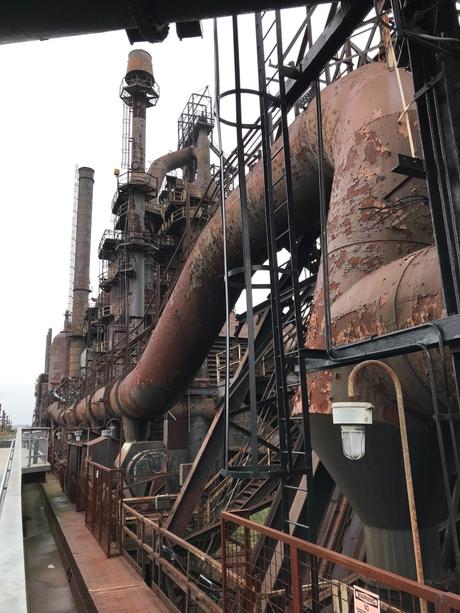It was a building on Broadway, just south of Times Square. I don’t know the name of the building or remember what business it may have housed, but I did notice on my quick walks through Manhattan on my way to the bus that it was being renovated. The facing had been removed and an exposed I-beam bore the words Bethlehem Steel. From coast to coast, and even to ships at sea, Bethlehem Steel was a major supplier. Today the factory is still. There’s a poignancy about such giants falling. The world as we know it was largely constructed from the products of the still impressive, rusting reminder of days of glory. No doubt the air is healthier to breathe and the noise level much more suited to humanity, but standing here next to this behemoth it’s easy to fall into a reverie.

I grew up near heavy industry. Nobody in my family was directly involved, but my hometown had a steel mill just across the river and my next hometown housed an oil refinery. Both are closed now and the area has been in an economic depression that has lasted for decades. Industry on this kind of scale requires workers willing to sacrifice much in order just to survive in an industrial world. Over 500 workers died over the years at the Bethlehem Steel plant. Factory life involved dangerous jobs with machinery containing material at over 3,000 degrees, and single pieces of equipment that could easily crush a person beyond recognition. Workers were in some sense expendable as the collective, the nation, grew. The factory never shut down, running all through the night, seven days a week. The profits were enormous. So were the costs.
Global warming was well underway as the greenhouse gases belched into the sky. Bethlehem Steel wasn’t the only polluter, of course. Heavy industry, industrial farming, individual cars—we seem to be determined to poison the air we breathe in order to make money. If the pandemic has taught us anything it’s that we’re all connected. Rising prices and supply chain breakdowns have underscored that we all depend on each other worldwide. Climate change has already assured that disruptions will continue and likely worsen. There’s a kind of autumnal beauty in desolation. These great steel stacks stand rusting and silent beneath a leaden but too warm sky. Actions have consequences, and those that affect many create ripples that become waves. We have created monsters but we can’t control them.
